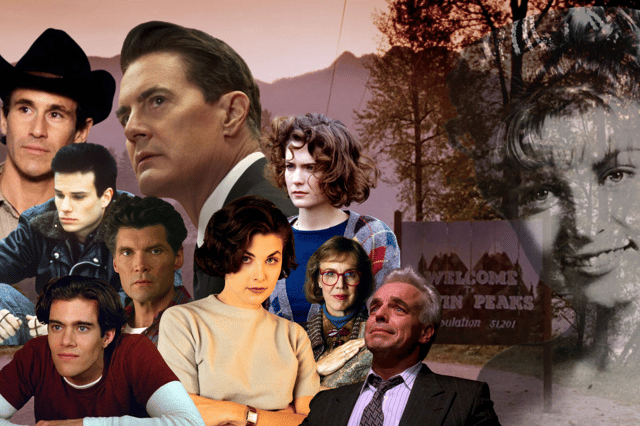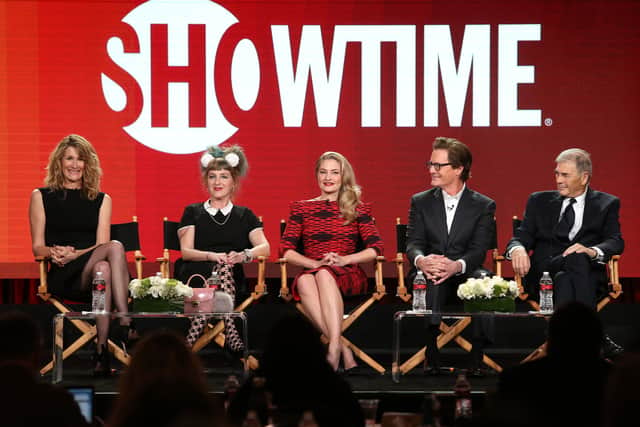Twin Peaks at 23; David Lynch’s eccentric take on primetime US dramas was first broadcast this weekend
People in this article


It was a question that many asked from April 8 1990; who killed Laura Palmer? While perhaps the uninitiated might have expected a police procedural drama akin to Hill Street Blues or Law and Order, both titans of US television at the time, instead they were transported to Twin Peaks, and a surrealistic cast of characters each almost as unhinged as the next.
This weekend marks the 23rd anniversary of the debut of David Lynch’s cult television series Twin Peaks, which made household names of its stars Kyle MacLachlan, Sherilyn Fenn and Lara Flynn Boyle. It also introduced us many mainstream viewers to the surrealist, often ominous approach the then Oscar nominated director presents throughout his works. Lynch earned mainstream recognition as the director of 1980’s biopic The Elephant Man, but to film buffs (myself included), we first recognized Lynch as an auteur of the bizarre with his feature debut, 1977’s Eraserhead.
Advertisement
Hide AdAdvertisement
Hide AdWhile mainstream cinema was somewhat unkind at that stage to Lynch, who attempted a big budget film with 1984’s Dune, which was critically panned upon its release. Despite Lynch since disowning the film and spoken publicly about his dissatisfaction with the final product, he has stated that he learned a valuable lesson about the importance of creative control when working on a film.
This would then lead to a host of neo-surrealist works that would achieve that critical acclaim within the film industry that Lynch had managed to garner after his art-house debut. Blue Velvet, with Dennis Hopper’s incredible scenery chewing, was the first time that Lynch would work with Kyle Maclachlan and Laura Dern - and while Dern would return in Lynch’s next film, 1990’s Wild At Heart with Nicolas Cage, Maclachlan would instead be cast as the now iconic Agent Dale Cooper in Lynch’s first foray into television.
It was with the encouragement of Lynch’s agent, Tony Krantz, to transition into television where at a time it was viewed as “beneath” film directors - a trend we have seen completely dissipate since the rise of HBO and streaming services - as the director was still coming to terms with a failed adaption of Goddess, a best-selling book around Marilyn Monroe. But it would be teaming up with Hill Street Blues writer Mark Frost, who was used to creating long-term storylines and large ensemble casts through his work on the procedural drama, that Lynch would not only find a new friend, but also a co-conspirator towards his eventual television project.
Twin Peaks, right from its opening episode, became as intriguing for it’s visuals and eccentric characters as it was the mystery of who killed popular schoolgirl Laura Palmer, found wrapped in plastic on the shores of Twin Peaks by Pete Mantell - played by Jack Nance, who was the main protagonist in Lynch’s hallowed debut, Eraserhead.
Advertisement
Hide AdAdvertisement
Hide AdCue the shady practices taking place throughout Twin Peaks, from the sale of a lumber mill, a teenage love triangle, a twin cousin and an evil spiritual entity that led to a number of “existential” characters that would lead up to a twist in Season One. Fans loved it, as the show continues to be talked about by fans old and new to this day - and the question isn’t merely who killed Laura Palmer… slowly that became “who is actually in control of their mortal being in Twin Peaks.”
As mentioned - this isn’t your simple police procedural drama, despite Frost’s previous works in the field It is perhaps the vetting from Frost to Lynch how far he could take the supernatural elements of the show before it completely eschewed the mystery surrounding Laura Palmer - and to Lynch’s credit, he reeled it in a little more than usual. This is saying something given some of the nightmarish or fever dreamish moments the show has presented.
In one of the first times a television show hasn’t cashed in on a book deal or a novelisation, Lynch’s Twin Peaks universe took advantage of other forms of media to propel the story even further. Dale Cooper would be the focus of one of these books, "The Autobiography of F.B.I. Special Agent Dale Cooper: My Life, My Tapes," co-written by Lynch, and explored some of the backstory further of the unique FBI agent, including his ties to Tibetan Buddhism and his encounters with supernatural beings.
It also delved into his personal life, including his relationships with women and his struggles with addiction - leading many to wonder if what we’ve learned about Dale Cooper through the series was perhaps a case of an unreliable narrator.
Advertisement
Hide AdAdvertisement
Hide AdDespite being a ratings success in its first season, the series underwent the difficult second season process, with a number of problems arising despite the show’s critical and commercial acclaim. Firstly was a big one from a narrative standpoint; now that the death of Laura Palmer has been solved, where to next? Perhaps more of an exploration into the otherworldly elements at play in Twin Peaks and the waiting room (aka the “red room)?
Not if ABC executives had anything to do with it; which ultimately led to Lynch and Frost butting heads throughout the production of season two, in particular Lynch felt that the network was interfering too much with the show's direction and tone, which led him to distance himself from the series. WIth the continued butting of heads and declining ratings, Twin Peaks was cancelled after two seasons - and a legion of fans distraught over what they felt were a number of questions that were never given the time t


Which was great when Showtime announced they had commissioned a third series in 2017 - a sweet sixteen years since the untimely culmination of the series, and one that thankfully answered a number of questions that remained unanswered for over a decade. One of which included who was Diane that Cooper was always sending voice memos to?
In an age where we revere television as an artform just as pertinent as film, if not more at times, we perhaps take for granted how earlier television shows such as The Sopranos or The Wire demonstrated that long-term storytelling and complex character can exist outside the remit of the silver screen. Twin Peaks was one of the early predecessors to the exploration of what television series can get away with in terms of narratives, story telling and being art-house at the same time; a defining feature throughout Lynch’s works.
Advertisement
Hide AdAdvertisement
Hide AdThey say that without The Sopranos, we would not have blockbusters such as Game of Thrones, The Last of Us and even Ted Lasso, that explores the human spirit amid a backdrop of football. I’d say that is partially true, but the braveness of Twin Peaks before Tony Soprano and crew graced our screens surely demonstrated that television could be mature and steeped in backstory long before HBO took that mantle.
Comment Guidelines
National World encourages reader discussion on our stories. User feedback, insights and back-and-forth exchanges add a rich layer of context to reporting. Please review our Community Guidelines before commenting.
